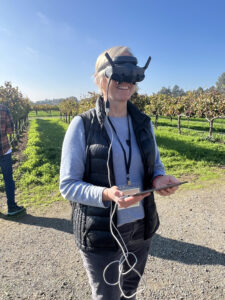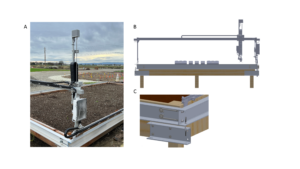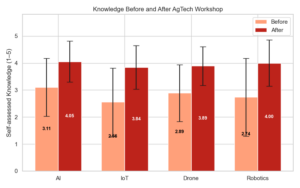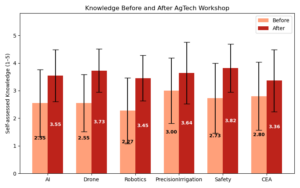Progress report for WPDP23-013
Project Information
The use of technology is imperative to produce food, feed, fiber, and energy sustainably to meet the current and future demands without compromising resources and the environment. The transition from conventional to sustainable agricultural practices is leading to noticeable shifts in workforce development programs in the agriculture industry to adopt cutting-edge technologies, such as drone technology, robotics, automation, and artificial intelligence (AI), in farms. This transition toward sustainable, digital agriculture requires informative education and high-impact practices to keep agricultural professionals’ knowledge, skills, and ability (KSA) relevant to future work. The primary objective of this project is to educate the participants with the essential KSA to facilitate the transition of the new wave of technology revolution to farms. We pursue our goal by organizing a series of two-day workshops focused on disruptive technologies, including drones, robotics, and automation. We allocate two workshop offerings to crop advisors and agricultural specialists and two offerings to high school teachers and community college instructors. Ag specialists and advisors will walk away with a deeper awareness of the need for drone technology, robotics, and automation and with fostered technical skills for using these modern technologies for sustainable farming. Teachers and instructors will gain the essential knowledge and skillsets to develop curricula and strategies for educating the next generation of agricultural professionals through innovative pedagogy and high-impact practices in the midst of rapidly changing technology. Participants are expected to incorporate the new knowledge obtained in this program in their extension education, consulting services, educational programs, and policy-making activities. The primary outcome indicators to demonstrate our success in achieving the defined intended outcomes are changes in participants’ KSA as a short-term change (e.g., learning new topics about innovative technologies) and in their behavior/action as a medium-term change (e.g., assisting growers in using these technologies to make informed decisions).
The proposal’s objectives fall into three main categories:
Objective 1: Assess the needs of California producers and analyze the regional job market’s demand to demystify what technical knowledge and technical skills agricultural professionals require (or are expected) to have to facilitate the adoption of innovative technologies aimed at promoting sustainable agriculture.
Objective 2: Develop curriculum and hands-on activities for the workshop. The educational modules developed for the proposed program and the experience gained through the program will be invaluable resources for developing evidence-based curricula, science-based teaching materials, and high-impact activities that can benefit a wide range of educational programs, including K12 programs, community colleges, and universities to advance student understanding of modern transformational technologies in agriculture. In addition, there is a synergistic and complementary relationship (e.g., sharing equipment, resources, and educational materials) between the proposed program and the newly-launched Agricultural and Environmental Technology major at UC Davis, which aims to bridge the disciplines of agriculture, applied engineering, and management.
Objective 3: Foster the technological knowledge and technical skills of agricultural professionals (industry partners, ag specialists, crop advisors, etc.), who will, in turn, assist the growers in adopting modern technologies, such as drones, robotics, and automation, to move toward sustainable agriculture by making targeted and informed decisions and tailoring their management plans to their desired outcomes.
To ensure the success and productivity of the workshop, the project team will leverage the available resources, such as the University of California Agriculture and Natural Research, UC Davis Center for Educational Effectiveness, and UC Davis Cooperative Extension Program, and the other institutes and entities across the Western region of the United States. In addition, local companies, such as FarmBot and Parallax, have agreed to collaborate on the development of curricula and educational activities.
A tentative timeline, the list of milestones, and the expected outcomes per each milestone are outlined below.
Needs assessment: [Sep 2023 – Feb 2024]
- Surveys and interviews with producers and industry partners are performed.
- The essential technical KSA, which agricultural professionals require to implement drones, robotics, and automation, is recognized.
- The time windows that work best for the majority of potential audiences are identified.
Curriculum development and materials preparations: [Feb – Jul 2024] [revising curriculum based on evaluation results: Jan – Apr 2025]
- Evidence-based curricula and hands-on activities are developed for each section in the first year and revised in the second year.
- Required equipment and educational tools are purchased.
Executive planning of the workshop: [Mar – Jul 2024] [Mar – Jul 2025]
- Strategic planning for the workshop is performed (format, venue, date, experimental tools and activities, registration, and participant financial support).
Outreach and advertisement: [Mar – Apr 2024] [Mar – Apr 2025]
- The workshop program is widely advertised across the Western States.
- Underserved communities are identified and encouraged to participate.
Application and review process: [May – Jun 2024] [May – Jun 2025]
- The application and review process is completed.
- The selected candidates are admitted and encouraged to provide their acceptance decisions by the end of June.
Host the workshop: [Aug 2024] [Aug 2025]
- Two workshop series will be held each year.
Assess, track, and document the outcomes of the workshop: [Sep – Dec 2024] [Sep – Dec 2025]
- Survey and interview data are analyzed and documented.
- A comprehensive report will be compiled after the second year.
Cooperators
- (Educator)
- (Educator and Researcher)
- (Researcher)
- (Educator and Researcher)
Education
Through collaboration with the AI Institute for Next Generation Food Systems (AIFS), we organized two workshops. The first one, held in September, hosted 10 instructors and teachers from California, Oregon, Washington, and Nevada. Over two days, participants engaged in hands-on activities and technical sessions, learning how to develop a curriculum on AI, IoT, drones, and robotics to better integrate these technologies into educational programs. The second workshop, held on December 6–7, hosted 20 participants from California, Hawaii, New Mexico, and Oregon, including industry professionals, growers, and crop advisors. Eight UC Davis faculty presented their research and facilitated hands-on activities, covering advanced applications of robotics, drones, and precision irrigation. In total, we provided 20 participants with stipends ($800) to support their participation. AIFS provided lodging for ten people who attended the first workshop.
In 2025, we organized two more workshops. The first one, held in September, hosted 22 instructors and teachers from California, Oregon, and Washington. Over two days, participants engaged in hands-on activities and technical sessions, learning how to develop a curriculum on AI, IoT, drones, and robotics to better integrate these technologies into educational programs. The second workshop, held in November, hosted 12 participants from California and Oregon, including industry professionals, growers, and crop advisors. Eight UC Davis faculty members presented their research and facilitated hands-on activities, covering advanced applications of robotics, drones, and precision irrigation. In total, we provided 20 participants with stipends ($800) to support their participation.
The workshop is advertised extensively through a wide range of targeted audiences. The project website (https://agtechworkshop.ucdavis.edu/) contains information about the workshop, application, gallery, etc.
|
Date |
Audience |
Number of participants |
States |
|
September 12-13, 2024 |
High school teachers and community college instructors |
10 |
California, Oregon, Washington, and Nevada |
|
December 6–7, 2024 |
Growers, industry, farm managers, crop advisors |
20 |
California, Hawaii, New Mexico, and Oregon |
|
September 11-12, 2025 |
High school teachers and community college instructors |
22 |
California, Oregon, Washington |
|
November 21-22, 2025 |
Growers, industry, farm managers, crop advisors |
12 |
California, Oregon |
Education & Outreach Initiatives
Demystify the need for agricultural professional workforce with essential technical skills to implement drones, robotics, and automation in agriculture.
We conducted semi-structured qualitative interviews with seven farmers from California and engaged with four precision weeding startups. Our survey findings revealed several key insights:
o Grower Perceptions: The feedback from farmers highlighted that traditional farming mentalities, coupled with a perceived lack of formal education in the field, act as significant barriers to the widespread adoption of precision weeding technologies.
o Educational Engagement: Interestingly, some of the startups we interviewed expressed a desire to collaborate more closely with universities. Their aim is to actively participate in shaping educational curricula and potentially develop specialized two-year technical degree programs. This strategic move is driven by the need to address workforce challenges within the agricultural technology sector.
Besides the interview, we investigate the findings of other resources regarding the labor market in California. According to a labor market analysis conducted by the Central Valley/Mother Lode Center of Excellence in 2023, the demand for drone technology-related jobs in the region is substantial, with 180 annual job openings. However, only two individuals were awarded positions in this field, with a significant undersupply of 178 skilled workers. It is worth noting that the Central Valley is the agricultural heart of California, further emphasizing the importance of addressing this workforce gap. In the North Central Valley/Northern Mother Lode regions, all 45 open positions related to drone technology remained unfilled, which indicates a critical shortage of qualified professionals in this area.
This undersupply issue extends beyond drone technology to involve the broader domain of agriculture technology and sciences. For instance, a report published by the South Central Coast Center of Excellence for Labor Market Research in 2023 revealed that there were only 681 individuals who completed programs related to agriculture technology and sciences, while 1317 job openings existed in this field. This significant shortfall underscores the urgent need for a qualified workforce to meet the demands of the agriculture technology and sciences sector.
Our findings and investigations highlighted the timely relevance and importance of the proposed workshop series. Addressing these workforce shortages is vital for the continued growth and innovation of the agricultural industry in California.
The results were published in Agricultural Systems (Stakeholder mapping of precision weeding commercialization ecosystem in California), https://doi.org/10.1016/j.agsy.2024.104152.
Develop curriculum and hands-on activities for the workshop
For the drone sessions, we tested DJI Avata drones equipped with two different types of First-Person View goggles: DJI Goggles Integra and DJI Goggles 2. Our goal was to determine which of these goggles offers a superior experience for participants. Additionally, we have prepared a range of instructional materials so far, including information on FAA regulations and sensing technologies relevant to drones. The hands-on activities in this section encompass both manual and autonomous flight techniques.
In the 2025 workshop, we used DJI Goggles 2, and participants reported a highly positive experience. They particularly appreciated the immersive visual quality, low-latency response, and intuitive controls, which helped increase confidence during flight operations.
For the precision weeding sessions, we purchased the FarmBot Genesis XL v1.7, an open-source gantry-style educational robot. To facilitate these sessions, we established a raised bed with approximately 3x6 meters, featuring a dedicated aluminum frame designed to accommodate the FarmBot. Currently, we are in the process of developing a safety protocol to educate our participants on how to interact with the FarmBot safely and responsibly.
A. FarmBot installed on a raised bed. B. The CAD design of the support frame for the FarmBot. C. A mechanism to ensure the long-term alignment and level of the linear rails. Aluminum was chosen for the support frame because it will maintain dimensional stability independent of moisture, and its coefficient of thermal expansion matches that of the FarmBot.
We also developed a learning module to teach the Internet of Things (IoT) and its application in agriculture. This learning module aims to equip high school teachers and community college instructors with the knowledge and tools to integrate IoT and programming into their agriculture and technology curricula. We developed a hands-on, project-based approach using accessible hardware and software to make IoT concepts engaging and easy to teach. Our custom plug-and-play board simplifies sensor and actuator integration and allows students to focus on programming rather than wiring complexities. The module utilizes the Parallax Activity Board, a multicore microcontroller, along with BlocklyProp, a block-based programming tool, enabling educators to introduce IoT concepts without requiring prior coding experience. By adopting this learning module, educators can develop new curricula that prepare students for the future of precision agriculture and smart farming.

We developed all the required curriculum (drone, AI, IoT, and robotics) for the workshop. We will refine it based on the participants’ comments for the next offerings.
We developed a website to share course materials:
Foster the technological knowledge and technical skills of agricultural professionals (e.g., industry partners, ag specialists, crop advisors, etc.) and instructors (including K12 programs, community colleges, and universities).
We offered two-day workshops two times last year, one day focusing on drones and the other day on robotics/automation. Two offerings were allocated to high school teachers and community college instructors, who will educate the next generation of agricultural scientists and workforces, and the other to growers, crop advisors, and ag specialists, who will successively assist the grower in adopting cutting-edge technologies to promote sustainability.
In 2025, we offered two more two-day workshops with the same format. In total, we hosted 34 participants, 14 more than what we were supposed to.
Although the original requirement was to train 40 participants across four workshops, a total of 64 participants were trained, exceeding the target.
Participants across both workshops expressed high satisfaction, with an average rating of 4.6 out of 5, and showed an equally strong likelihood of recommending the workshops to others (mean 4.5). Survey results indicated their knowledge increased significantly across various topics, including drones, AI, IoT, robotics, and precision irrigation. Attendees highlighted the workshops' immediate applicability and their plan to integrate these technologies into curricula, projects, and farming practices. Many valued the hands-on sessions, emphasizing their practical relevance and the potential for incorporating advanced technologies into real-world applications like precision irrigation, crop management, and greenhouse operations.
Similarly, in 2025, participants across both workshops expressed high satisfaction, with an average rating of 4.6 out of 5, and showed an equally strong likelihood of recommending the workshops to others (mean 4.7).
Educational & Outreach Activities
Participation summary:
Learning Outcomes
Project Outcomes
The workshops provided participants with hands-on training, technical sessions, and expert-led discussions focusing on modernizing agriculture education and research.
Learning Outcomes
Survey results showed a significant increase in knowledge across key AgTech areas. Before the workshop, participants had limited familiarity with topics like AI, robotics, and remote sensing, with average self-reported scores below 3 on a 5-point scale. After attending, mean scores improved by over 1 point per category, demonstrating a strong learning impact.
|
|
First workshop |
|
|
|
Before |
After |
|
Drone |
2 |
3.3 |
|
AI |
2.4 |
3.7 |
|
Robotics |
2.3 |
3.6 |
|
IoT |
2.2 |
3.7 |
|
|
Second workshop |
|
|
|
Before |
After |
|
Remote sensing (drones and satellite imagery) |
2.47 |
3.58 |
|
AI |
2.58 |
3.26 |
|
Robotics |
2.42 |
3.42 |
|
Precision irrigation and water management techniques |
2.79 |
3.53 |
|
Safety in agriculture |
2.53 |
3.58 |
In 2025, the survey shows a clear increase in self-assessed knowledge among participants following the AgTech workshop across all four topic areas: AI, IoT, drones, and robotics. Prior to the workshop, high school teachers and community college instructors reported moderate familiarity with these technologies, with average ratings ranging from approximately 2.5 to 3.1 on a 5-point scale. After the workshop, average self-assessed knowledge increased substantially in every category, reaching around 3.8 to 4.0. These results indicate that the workshop was effective in improving participants’ understanding and confidence across a broad range of emerging agricultural technologies.
A similar pattern was observed for growers and industry participants, as shown in the figure. Across all topic areas, AI, drones, robotics, precision irrigation, safety, and controlled environment agriculture (CEA), participants reported notable increases in self-assessed knowledge following the AgTech workshop.
- Enhanced Technical Proficiency – Participants gained practical experience in using sensors, developing AI-driven models, and deploying drones for precision agriculture. Many reported an improved ability to integrate these technologies into their curricula or professional work.
- High Engagement and Satisfaction—The workshops received an average rating of 4.6 (out of 5) and 4.6 (out of 5) for recommending the workshop to others. The combination of technical content and hands-on learning was highly valued.
- Real-World Applications – Attendees identified direct ways to apply workshop concepts, such as using satellite imagery and AI for irrigation management, integrating IoT in greenhouses, and implementing robotics for farm automation.
Action Outcomes and Impact
Beyond individual learning, the workshops facilitated broader action and curriculum development, with several educators and professionals already applying their new knowledge:
- Curriculum Development – Many instructors planned to develop new coursework integrating IoT, coding, and robotics into agriculture programs. Some expressed interest in partnering with engineering and technology departments to offer interdisciplinary AgTech modules.
- Industry and Research Integration – Crop advisors and farm managers explored AI applications in farm decision-making, such as remote sensing for crop monitoring and precision irrigation strategies. Some participants planned to use satellite data and AI to optimize agricultural resource use.
- Workforce Training & Outreach – Several attendees committed to developing training resources for farmworkers and students, emphasizing technology literacy, data interpretation, and safety. These initiatives aim to bridge the digital divide in agricultural education.
Future Directions & Recommendations
Participants suggested expanding the workshop duration, incorporating more hands-on activities, and adding industry case studies. Many requested specialized sessions focusing on AI, robotics, and IoT separately to allow for deeper engagement with each topic.
Conclusion
The workshops successfully enhanced AgTech literacy among educators and professionals, leading to new curriculum development, applied research, and workforce training initiatives. By equipping participants with technical skills in AI, IoT, and robotics, these efforts will ensure that future agricultural professionals are prepared for the challenges of smart farming and precision agriculture.
Not available at this point.




